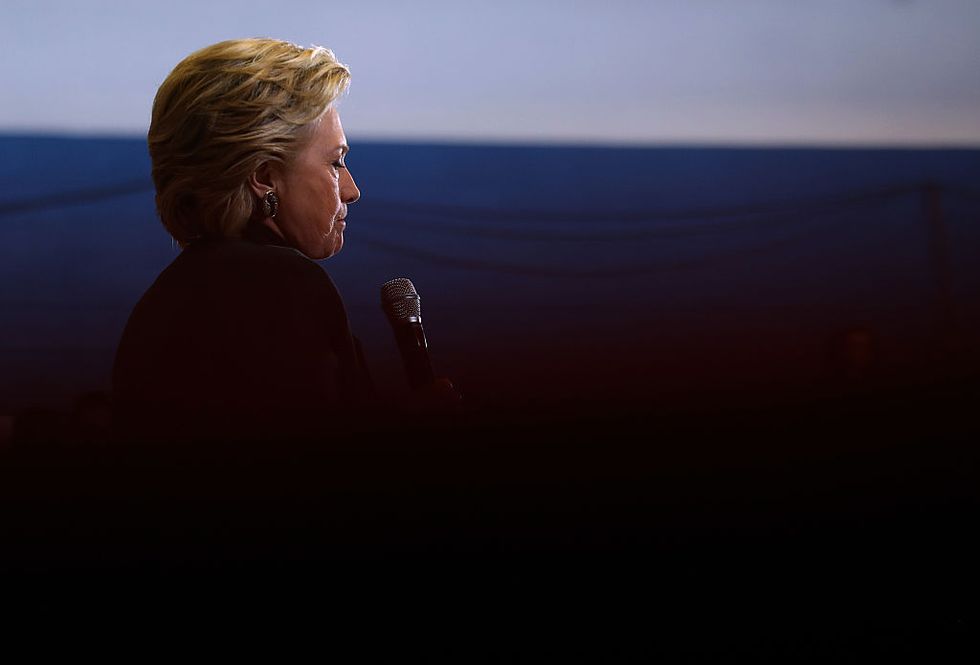
Hillary Clinton (Justin Sullivan/Getty Images)

WHITE PLAINS, N.Y. (TheBlaze/AP) — Sure, Donald Trump has said he plans to accept the results on Election Day, "if I win." But what if he doesn't?
While the answer to that question has so far remained unclear, and apparently by design, given the Republican presidential nominee said during Wednesday's debate that he wants to keep voters in "suspense" over the issue, Hillary Clinton's campaign, according to a Friday report from the Associated Press, is preparing for the possibility that Trump might not concede, should he lose next month.

Predicting Trump will continue his season-long refrain that the election is "rigged" against him, the Democratic presidential nominee's team is hoping to best the GOP candidate by a large electoral margin.
While Clinton, who spoke after Trump at the Al Smith charity dinner Thursday night, made light of the billionaire businessman's suggestion he would challenge the election's outcome during her speech at the New York event, joking, "I didn't think he'd be OK with a peaceful transition of power," it certainly has bothered Democratic vice presidential nominee Tim Kaine.
"Donald is still going to whine if he loses. But if the mandate is clear, I don't think many people will follow him," Clinton's running mate said Thursday during an interview on CNN's "New Day."
Clinton, whose campaign aides insist the former secretary of state is not taking the Nov. 8 outcome for granted, is working hard to find a way to help Americans forget the partisan battle that has waged now for more than a year, which is, needless to say, quite a tall order.
"I've got to figure out how we heal these divides," Clinton said Friday during an interview on WBTP, a Tampa radio station. "We've got to get together. Maybe that's a role that is meant to be for my presidency if I'm so fortunate to be there."
While Clinton's campaign has long focused on maintaining pathways to cross the threshold of 270 electoral votes, it's now looking to capture an expanded number of states that could also help determine control of the Senate — including Republican-leaning Arizona.
Polls indicate that Clinton has extended her advantage in several toss-up states during the three fall debates, giving her campaign more confidence. She has maintained stable leads in states such as Pennsylvania, Virginia and Colorado, as well as a narrow edge in Florida and North Carolina.
"They're looking at it like this: We've got these doors of opportunity open, let's make sure we go down all of them,'" said Jeremy Bird, the national field director for President Barack Obama's 2012 campaign who is helping Clinton's team.
If Clinton wins the White House, she will enter as one of the least popular first-term presidents in generations. While Trump has suffered from high unfavorable ratings, particularly among women, Clinton has been hampered by polls showing more than half of the public considers her to be untrustworthy.
Some Republicans are already preparing for Trump's defeat, downplaying the significance of a Clinton triumph.
"On Nov 8, Clinton's claims of a mandate will fly in the face of reality. She only won by not being Trump," tweeted conservative writer Erick Erickson. Rolling up a big victory in the Electoral College would let Clinton push back against that notion and assert that voters had rejected what she has called Trump's mean, divisive message.
In a race against Trump and independents Gary Johnson and Jill Stein, Clinton may struggle to reach 50 percent of the vote. But competing in states such as Arizona and pushing for Senate victories in Missouri and Indiana might help Democrats in their quest to recapture the Senate and give her a better chance of surpassing Obama's 332 electoral votes in the 2012 campaign.
Clinton's campaign is making a significant push in Arizona, which offers 11 electoral votes and has stayed in the Republican column in all but one presidential election since 1952. Bill Clinton was the last Democrat to carry the state, in 1996.
First lady Michelle Obama courted voters in Phoenix on Thursday, following appearances by Vermont Sen. Bernie Sanders and the Clintons' daughter, Chelsea Clinton. The campaign is spending $2 million in advertising and toying with sending Clinton herself there before Election Day.
"I think it's clear that Hillary Clinton has a chance to win Arizona just like her husband did 20 years ago," said Rodd McLeod, a Phoenix-based Democratic strategist who helped Clinton's campaign during the primary.
Two other Republican-leaning states could prove tempting.
Georgia, which has had an influx of diverse voters in the Atlanta area, is considered a future battleground state, with many Democrats comparing it to North Carolina.
Utah overwhelmingly supported Mitt Romney, the nation's first Mormon presidential nominee, with more than 72 percent in 2012. But many of the state's Republicans have abandoned Trump and polls show Clinton and Trump in a tight contest against independent Evan McMullin, a conservative former CIA officer who graduated from Brigham Young University.
If McMullin captures Utah, he will be the first independent presidential candidate to win electoral votes since George Wallace in 1968.